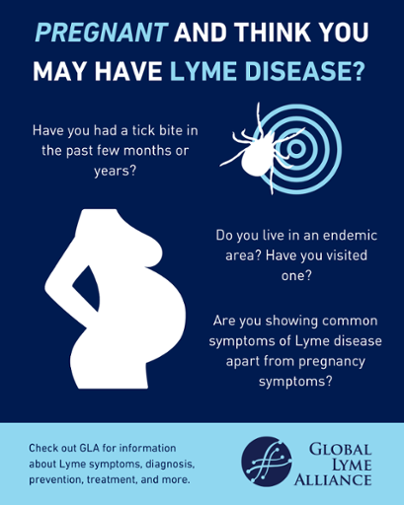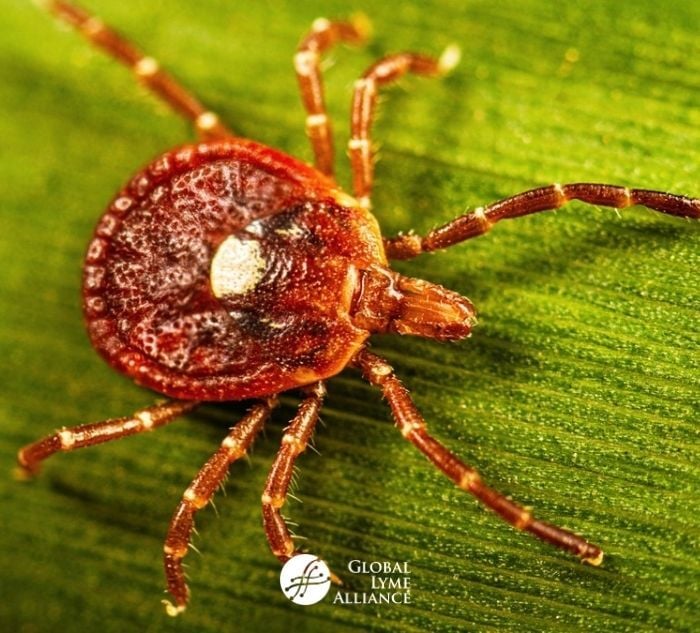
Lyme disease affects people from all walks of life. This includes adults, children, and sometimes, even babies. The mere thought of infection is terrifying for parents, who want their children to be free to play outside but also worry about the years of debilitating symptoms a single tick bite infected with borrelia burgdorferi could prompt. Unfortunately, such fears also loom large for pregnant women, as both they and their babies can suffer greatly if infected while expecting.
Not only can this illness cause untold pain and discomfort for women who are already subject to a whole host of physical and mental concerns, it could also increase the likelihood of miscarriage — or even lead to an infection of the placenta or the fetus. Research about the impact of Lyme borreliosis and other tick-borne diseases on pregnancy is limited, but we've compiled what little evidence is available so that you can prepare accordingly and avoid any preventable adverse effects.
How Do I Know If I Have Lyme Disease While Pregnant?
Pregnancy brings a whole host of unexpected symptoms and side effects, which can vary dramatically from one person to the next. Many of these concerns overlap with the common symptoms of Lyme disease, so it can be difficult to distinguish between perfectly normal annoyances and causes for alarm.
The first source of concern should be your history with ticks. If you've had a tick bite in the last few months or years and are beginning to observe common symptoms of Lyme disease or another tick-borne infection, it's important to seek medical attention. While you may be tempted to chalk your discomfort up to the usual aches and pains of pregnancy, these issues should prompt an immediate visit to the doctor:
- Chronic fatigue, often resembling flu-like tiredness
- Stiff neck, sometimes accompanied by a headache
- Swollen lymph nodes
- Lyme arthritis
- Eye strain or sensitivity to light
- Facial paralysis
- Joint and muscle pain, possibly involving a shooting sensation
- Rash near the tick bite resembling a bullseye (erythema migrans)
- Neurological symptoms
Any one of these symptoms might not seem particularly worrisome alone, especially as many (such as fatigue) are so closely tied to pregnancy. If several show up at once, however, it's prudent to check for Lyme. If nothing else, you'll want peace of mind for you and your unborn baby, given the implications of infection in utero.
If I'm Pregnant, Should My Doctor Check for Lyme Disease?
If you are at all concerned about Lyme disease, it's best to get insight from a trusted medical professional. This applies whether you are or aren't pregnant — but it takes on a new level of urgency if you're expecting.
Some symptoms — such as rashes — will be evident during regular obstetric checkups, but others might not be visible unless you let your doctor know of any unusual symptoms you're experiencing.
Between appointments, take note of any concerning symptoms you observe — especially if you believe they appeared after your tick bite. Never hesitate to let your doctor know whether or why you're worried.
Feel free to seek a second opinion if your healthcare provider is unable to appease your concerns, particularly if your symptoms become more intense over time. Unfortunately, it may be necessary to see several medical professionals prior to actually receiving a diagnosis.
This remains a sadly expected part of the Lyme infection experience, with some patients waiting months or even years before getting the treatment they require. When you're pregnant, however, you can't afford to wait it out in hopes that your symptoms will resolve on their own.
What Happens If I'm Not Treated For Lyme Disease While Pregnant?
Prompt diagnosis and antibiotic treatment are crucial, regardless of a developing fetus, breastfeeding, or fertility concerns. After all, symptoms can be severe if left untreated and may cause months or even years of suffering. Expecting mothers deal with enough as is — they certainly don't need the added discomfort, fatigue, and emotional distress that accompany Lyme.
In addition to causing needless suffering during what should be an exciting time of life, Lyme can pose a risk for both mother and child. There are multiple documented cases of Lyme spirochetes (harmful bacteria shaped like corkscrews) crossing into the placenta — not to mention, the general knowledge that other spirochetes (such as the bacteria responsible for syphilis) can be passed in utero.
While research on the link between Lyme and miscarriage remains limited, similar infections of the placenta are believed to increase the likelihood not only of miscarriage, but also of stillbirth and preterm birth. CDC Division of Vector-Borne Diseases (DVBD) expert Charles Ben Beard tells Scientific American, "While there's no evidence to link Lyme disease in pregnant women to birth defects, there is evidence that untreated Lyme disease can lead to miscarriage."
Could I Pass Lyme Disease to My Child?
Upon spotting the symptoms of Lyme, your first thought might be: what if my newborn also has to battle these issues? It's unlikely that your baby will also be infected, but that doesn't mean you should rest easy.
Although rare, the maternal-fetal transmission of Lyme disease is technically possible. The CDC emphasizes the need for proactive antibiotic-based treatment, which can limit the potential for infecting the placenta or passing the illness on to your child.
Unfortunately, we know very little about the true long-term impact of Lyme in utero. As the CDC points out, "There are no published studies assessing developmental outcomes of children whose mothers acquired Lyme disease during pregnancy."
Still, a variety of medical professionals who specialize in Lyme say they have encountered evidence of gestational transmission. Several brave mothers have also come forward with difficult stories of sharing symptoms and diagnoses with their young children.
What to Know About Lyme Disease and Breastfeeding
If you're hoping to breastfeed your baby but have already been diagnosed with Lyme disease or another tick-borne illness, you can take comfort in knowing that you won't pass your illness on through breast milk.
While the illness itself will have little impact on your child, it's possible that certain treatment options could be problematic from a breastfeeding perspective. Some antibiotics are safer than others, so you'll want to discuss any potential medications in detail before you move forward with an antibiotic therapy.
- As one of the most common medications prescribed to patients with Lyme disease, doxycycline can pass through breast milk in small quantities. It adheres to the calcium in the milk, so this should prevent any significant level of absorption. It is not, however, recommended while pregnant, as it may impact tooth or bone development.
- Like doxycycline, amoxicillin is a common Lyme disease treatment that can be used safely while breastfeeding. The CDC cites this as the most likely prescription if you're diagnosed with Lyme disease while pregnant.
- Approved to treat Lyme disease in its early stages, cefuroxime is generally well-tolerated. However, while the NIH claims that cefuroxime is safe for breastfeeding mothers to use, diarrhea and thrush have occasionally been reported in response to taking medications classified as cephalosporins.
Over-the-counter medications must also be taken into account. While many patients rely on the aforementioned antibiotics, some OTC options can provide temporary relief for symptoms such as joint pain or achiness. Check with your doctor before taking these medications; while most are perfectly fine, a medical professional can steer you toward the safest solutions.
How to Protect Yourself From Lyme Disease
The cliche "an ounce of prevention is worth a pound of cure" clearly applies to Lyme disease. Debilitating symptoms can have a huge impact on your everyday life and your parenting journey, so you owe it to yourself and your children (both current and future) to take precautions whenever possible.
This begins with preventing tick bites. No, you don't have to stop spending time in the great outdoors, but a few simple measures can dramatically reduce your risk:
- Wear long layers when spending time in tick-heavy areas.
- Tuck pants into your boots or shoes, especially in wooded areas.
- Check closely for ticks after a busy day outside.
- Use insect repellents. Products containing DEET are more effective.
Despite these efforts, you may occasionally get tick bites. The moment you notice a tick attached, find tweezers and use them to grasp the tick as close to the skin as you can get. Fine-tipped tweezers are ideal — not the squared-off design you typically use to shape your eyebrows.
Once you've gotten hold of the tick with the tweezers, pull up slowly, applying steady pressure. Avoid jerking or twisting, as this could tear the tick and leave the head embedded.
Once you've successfully removed the tick, clean the entire area with rubbing alcohol. From there, you have the option to send the tick in for testing. This can provide valuable peace of mind if you're worried that the tick was infected.
In the days and weeks following a tick bite, be mindful of common symptoms, such as headaches, muscle aches, or chills. Don't hesitate to seek medical attention the moment you suspect something is wrong. Depending on the situation, you could potentially get on a swift course of preventative antibiotics.
Advocate for yourself, even if medical professionals initially claim that there's nothing to worry about. While Lyme patients have been notoriously disregarded in the past, this is finally beginning to change. With increased awareness comes a better chance of ensuring that your early symptoms are taken seriously to prevent an adverse outcome.
The Fight Against Lyme Continues: Advocating for a Safer Future
Unfortunately, there's little source of comfort for mothers or mothers-to-be concerned about maternal Lyme disease — it continues to be extraordinarily dangerous for mothers and babies alike.
From something as simple as insect repellent to steering clear of tall grass, the best we can do for now is to take every possible measure to prevent the disease in the first place and raise our healthy babies. Beyond this, we can seek prompt diagnosis and treatment in the event of a deer tick bite. It's also important to advocate for ongoing research so that, in the future, parents will feel better equipped to protect their children through every stage of life.
Click below to sign up for GLA's newsletter.
The above material is provided for information purposes only. The material (a) is not nor should be considered, or used as a substitute for, medical advice, diagnosis, or treatment, nor (b) does it necessarily represent endorsement by or an official position of Global Lyme Alliance, Inc. or any of its directors, officers, advisors or volunteers. Advice on the testing, treatment or care of an individual patient should be obtained through consultation with a physician who has examined that patient or is familiar with that patient’s medical history.









-2.jpg)